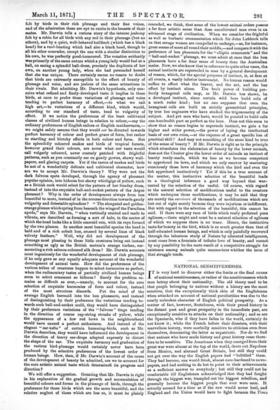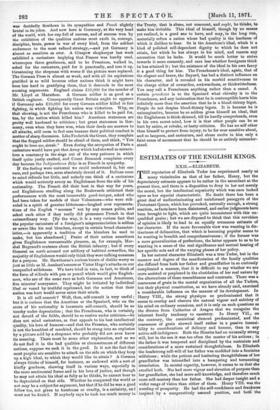NATIONAL SENSITIVENESSES.
IT is very hard to discover either the limits or the final causes of national sensitivenesses, or rather of the sensitivenesses which men betray about their nationality. The old theory used to be that people belonging to nations without a history are the most sensitive, that the exceptionally thick skin of the Englishman when attacked on account of national peculiarities was due to the nearly unbroken character of English political prosperity. As a matter of fact, however, Scotchmen, with their proud history in the distant past and great prosperity in the immediate past, are exceptionally sensitive to attacks on their nationality ; and so are the Spaniards, who if they have fallen in the world, certainly do not know it ; while the French before their disasters, with their marvellous history, were morbidly sensitive to criticism even from themselves, denouncing the latter as unpatriotic. Nor do we find that nations who have made history and great history cease there- fore to be sensitive. The Americans when they emerged from their great war were almost at the top of the world, drove out Napoleon from Mexico, and alarmed Great Britain, but still they could not get over the way the English papers had " belittled " them. They had become, one would think, almost case-hardened to news- papers, and had nothing to do but to point to their achievements as a sufficient answer to everybody ; but still they could not be comfortable till Englishmen acknowledged that they had fought through the biggest war, trampled out the biggest rebellion, and generally become the biggest people that ever were seen. It actually seemed for a time as if the raw would never heal, and England and the Union would have to fight because the Times
was decidedly Southern in its sympathies and Punch slightly brutal in its jokes. And now here is Germany, at the very head of the world, with her cup full of success, and of success won by the exhibition of the qualities nations most exult in, courage, discipline, brain, power in war of every kind, from the solidest endurance to the most refined strategy,—and yet Germany is almost as sensitive as ever. A Glasgow shopkeeper last week exhibited a caricature implying that France was hardly used, whereupon three gentlemen, said to be Prussians, walked in, asked for the caricature, paid for it punctually, and tore it up, threatening the shopman with worse if the picture were replaced. The German Press is almost as weak, and with all its aspirations gratified is so wild because other nations think it might have been less hard in gratifying them, that it descends to the most amusing arguments. England claims £10,000 for the murder of Mr. Lloyd at Marathon. A German soldier is as good as a British engineer. Consequently Great Britain ought to approve if Germany asks £10,000 for every German soldier killed in fair fighting, in which fighting his nation was victorious. Why, on that showing, is not the Frenchman who is killed to be paid for, too, by the nation which killed him? American statesmen are pretty well hardened to criticism ; but great statesmen in Ger- many, even when they have won, when their deeds are answers to all attacks, still seem to feel sore because their political conduct is matter of sharp discussion. Like Frederick the Great, they complain that the flogged soldier should be afraid of them, and think, "You ought to love me, sirrah." Even during the occupation of Paris a caricature would have put that Army which had showed so miracu- lous a constancy in the siege out of the very patience in which itself quite justly exulted, and Count Bismarck complains every clay because the Inde'pendance Beige is so French in sympathy.
If the feeling were universal we could understand it, but one race, and perhaps two, seem absolutely devoid of it. Italians seem to mind ridicule but little, and nobody can think of a caricature which would seriously annoy an Englishman from the aide of his nationality. The French did their best in that way for years, and Englishmen strolling along the Boulevards criticized their performances with the most immovable good-temper, asked who had been taken for models of their Volunteers—who were ridi- culed in a spirit of genuine bitterness—laughed over representa- tions of the English " meesses " not by any means polite, and asked each other if they really did pronounce French in that extraordinary way. [By the way, it is a very curious fact that the popular caricature of a foreigner's mispronunciation is seldom or never like his real blunders, except in certain broad character- istics,—is apparently a tradition of the blunders he used to make, but has abandoned.] Praise of their nation sometimes gives Englishmen unreasonable pleasure, as, for example, Mar- shal Bugeaud's sentence about the British infantry; but if every General on earth accused our soldiery of habitual cowardice, the majority of Englishmen would only think they were talking nonsense for a purpose. Mr. Hawthorne's curious bursts of dislike worry us just as little as M. Assolant's sneers or Victor Hugo's attacks on our unequalled selfishness. We have tried in vain, in fact, to think of the form of ridicule with pen or pencil which would give English- men, who are of the same race as both Germans and Americans, five minutes' annoyance. They might be irritated by individual libel or vexed by truthful reprimand, but the notion that their nation was hurt would never enter their minds.
It is all sell-conceit? Well, then, self-conceit is very useful ; but it is curious that the American or the Spaniard, who on the score of his nationality is incarnate self-conceit, should be so touchy under depreciation ; that the Frenchman, who is certainly not devoid of the foible, should be so restive under criticism—he does not mind caricature, as that appeals to his best intellectual quality, his love of humour—and that the Prussian, who certainly is not the humblest of mankind, should be stung into an explosion by a picture sold by a shopman who probably did not even know its meaning. There must be some other explanation, and as we do not find it in the bad qualities or circumstances of different nations, suppose we seek it in the good. Is it not the fact that most peoples are sensitive to attack on the side on which they keep up a high ideal, to which they would like to attain ? A German always thinks of himself, for instance, as endowed with a sort of kindly goodness, showing itself in various ways, especially in the more sentimental forms and in his love of justice, and though he may not attain his ideal as fully as he thinks, he cannot bear to be depreciated on that side. Whether he conquered the world or not may be a subject for argument, but that if he did he was a good fellow too, not given to harshness or cruelty, is a certainty, an I must not be denied. If anybody says he took too much money in the Treaty, that is abuse, not comment, and ought, he thinks, to make him irritable. This ideal of himself, though by no means yet realized, is a good one to have, and may, in the long ran, materially soften a nation whose bad quality is the hardness of which it dislikes to hear. So is the American's ideal, which is a kind of polished self-dependent dignity to which he does not attain, but which he has always in his mind, and resents any accusation that he lacks. It would be much better to strive towards; it more earnestly, and care less whether foreigners think he has attained it ; but the existence of the ideal in his own fancy is a good thing for him. The Frenchman's ideal, again, that of the elegant and brave, the Bayard, has had a distinct influence on his character, and is revealed in his morbid sensitiveness to the charge either of cowardice, awkwardness, or thickwittedness. You may call a Frenchman anything rather than a camel. A certain grandezza is to the Spaniard what chivalry is to the Frenchman, and any insinuation that he is contemptible hurts him infinitely more than the assertion that he is a blood-thirsty bigot. People do not despise blood-thirsty bigots. It is because he is unimaginative, because he so seldom gives himself an ideal, that the Englishman is thick-skinned, till he hardly comprehends, even in his own secret mind, how it is that other people can be so hurt by satire, or rebuke, or hasty criticism. He has no self other than himself to protect from injury, to be for ever sensitive about, and so lampoon, and caricature, and abuse excite in him only a faint sense of amusement that he should be so entirely misunder- stood.



































 Previous page
Previous page